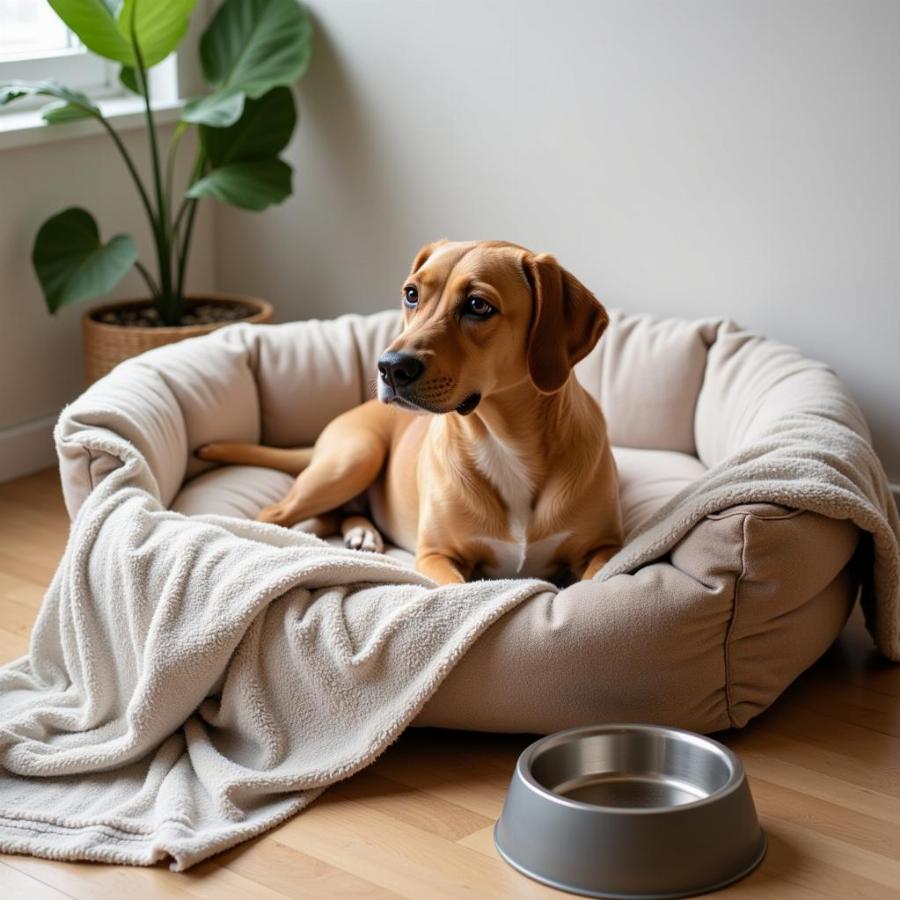Dealing with a sick dog is a worry for any owner, and pneumonia in dogs can be particularly frightening. While this article aims to provide helpful information, it’s crucial to remember that it does not replace professional veterinary advice. If your dog exhibits signs of pneumonia, immediate veterinary care is essential.
Pneumonia in dogs occurs when their lungs become inflamed, often due to infection. This can make it difficult for them to breathe, leading to other complications. Recognizing the symptoms early on can be critical in getting your furry friend the help they need.
Recognizing the Signs of Pneumonia in Dogs
While you can’t treat your dog’s pneumonia at home, you play a vital role in identifying the problem early on. Keep an eye out for these common symptoms:
- Coughing: This may be dry, wet, or even produce phlegm.
- Difficulty breathing: Your dog might breathe rapidly, take shallow breaths, or wheeze.
- Loss of appetite: They may refuse food and water, leading to lethargy.
- Nasal discharge: This could be clear, yellow, green, or even bloody.
- Fever: A temperature above 102.5°F (39.2°C) is a cause for concern.
- Lethargy: Your normally playful companion might seem unusually tired and reluctant to move.
If you notice any combination of these symptoms, it’s essential to contact your veterinarian immediately.
Can You Treat Dog Pneumonia at Home?
The short answer is no. Pneumonia requires veterinary care and often involves a multi-faceted approach including antibiotics, anti-inflammatories, and supportive care like oxygen therapy. Attempting to treat pneumonia at home without professional guidance can be dangerous and could worsen your dog’s condition.
However, there are ways you can support your dog’s recovery at home in conjunction with veterinary treatment:
- Administer medication as prescribed: Follow your vet’s instructions carefully, ensuring your dog completes the full course of medication.
- Provide a comfortable resting place: A quiet, warm, and draft-free area can help your dog rest and conserve energy.
- Encourage hydration: Offer fresh water frequently. If your dog is reluctant to drink, consult your vet about ways to encourage hydration.
- Ensure proper nutrition: Appetite often decreases with illness. Your vet may recommend special diets or strategies to entice eating during recovery.
 Providing a Comfortable Bed for Recovery
Providing a Comfortable Bed for Recovery
Preventing Pneumonia in Dogs
While not all types of pneumonia are preventable, you can take steps to reduce the risk for your furry friend:
- Vaccinations: Keep your dog up-to-date on vaccinations, including those that protect against kennel cough and canine influenza, which can lead to pneumonia.
- Hygiene: Practice good hygiene, especially when interacting with other dogs. Avoid dog parks if your dog is immunocompromised.
- Healthy Lifestyle: A balanced diet, regular exercise, and a stress-free environment can strengthen your dog’s immune system.
- Address Underlying Conditions: Manage any existing health conditions that could make your dog more susceptible to pneumonia.
“It’s always better to err on the side of caution,” says Dr. Emily Carter, a veterinarian with over 15 years of experience treating dogs. “If you suspect your dog might have pneumonia, don’t hesitate to seek immediate veterinary care.”
Caring for Your Dog After Pneumonia
Once your dog has recovered from pneumonia, continue to monitor their breathing and energy levels. Ensure they complete any prescribed medication and attend follow-up appointments with your veterinarian.
Remember, your dog relies on you for their well-being. By being informed and proactive, you can help your canine companion live a long, healthy, and happy life.
FAQs About Pneumonia in Dogs
Can humans get pneumonia from dogs?
While some respiratory infections can be zoonotic (transmissible between animals and humans), most cases of canine pneumonia are not directly contagious to people. However, practicing good hygiene is always recommended.
How long does it take for a dog to recover from pneumonia?
Recovery time varies depending on the severity of the infection, the dog’s overall health, and their response to treatment. It can range from a few weeks to a couple of months.
Can pneumonia in dogs be fatal?
Pneumonia can be serious, even life-threatening, especially if left untreated. Prompt veterinary care significantly increases the chances of a successful recovery.
What are the different types of pneumonia in dogs?
Pneumonia is broadly classified as bacterial, viral, fungal, or aspiration pneumonia (caused by inhaling foreign material).
Are certain breeds more prone to pneumonia?
While any dog can develop pneumonia, brachycephalic breeds (dogs with flat faces like Bulldogs and Pugs), puppies, senior dogs, and dogs with underlying health conditions may be more susceptible.
For more information on respiratory issues in dogs, you might find these articles helpful:
If you have any further concerns about your dog’s health, don’t hesitate to contact your veterinarian.
Need More Help?
Beaut Dogs is your one-stop resource for all things dog-related, providing trustworthy and insightful information about the canine world. For specific advice and support regarding your dog’s health, reach out to us at [email protected]. We’re here to help!